In the News–Perception & Psychology
Is Wells Fargo stuck in the denial stage of recovery?
Kate Berry, American Banker, April 7, 2019
![]()
Since Wells Fargo’s phony-accounts scandal broke in 2016, the bank’s public and private reactions have diverged significantly.
After an initial bout of blame directed at the thousands of employees who opened the fake accounts in an effort to meet aggressive sales goals, the bank pivoted to a public position of contrition, saying it was dedicated to fixing its corporate culture to ensure nothing like that could happen again. That line was offered by then-CEO Tim Sloan last month when he testified to Congress, in which he said the bank had made significant progress in atoning for its mistakes.
Yet in private, bank executives and many rank-and-file employees have taken the view that the bank’s problems are largely not of its own making and have been overblown by overbearing regulators, scoop-hungry reporters, hostile members of Congress, and a system that has put its actions under an (unfair) microscope.
In short, the bank has appeared to be in denial that it has a problem at all, some argue.
“Denial is one of the hardest issues for a company to address after a crisis,” said Davia Temin, president and CEO of management consulting firm Temin and Company. “It’s not over just because Wells is ready for it to be over.” […read more]
A Year of Reckoning for Davos Man (and One Woman) in the Alps
Jeff Green, Bloomberg, January 20, 2019
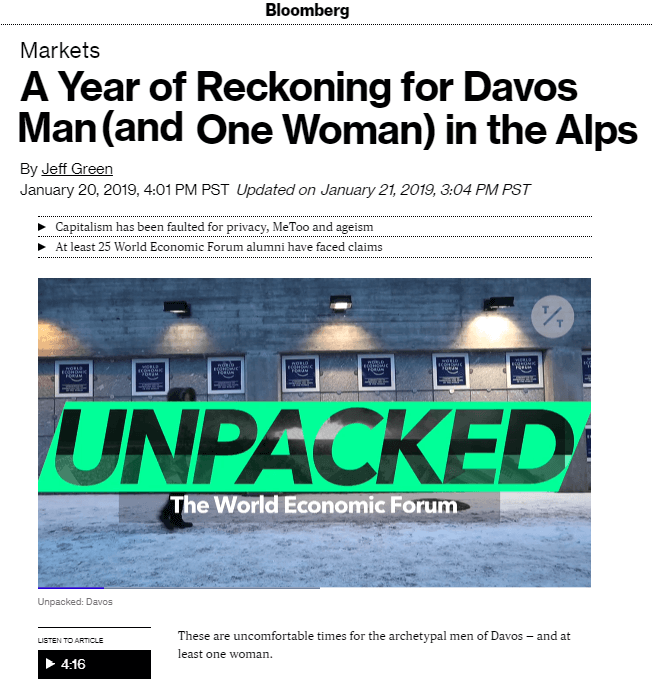
These are uncomfortable times for the archetypal men of Davos — and at least one woman.
Established in 1971 to support a global, capitalist vision of the future, the World Economic Forum in Davos this year also offers a reminder of the public humbling of some of its most visible champions. Dozens of the assembled business leaders and exemplars present and past have been brought low by a wide range of misconduct allegations, including sexual harassment, mismanagement and financial misconduct.
“At Davos they are both reflecting and setting the culture,” said Davia Temin, whose crisis consultant company has tallied more than 1,000 people, mostly men, accused of harassment and other misdeeds in the last year. That same list includes more than two dozen men who are present or past Davos attendees. “They reflect the culture of leadership, and sometimes looking in the mirror helps to spur the discussion.” […read more]
From Pot Podcasts to Taboo Tesla Tweets, Musk’s Antics Continue
Eve Tahmincioglu, Directors & Boards, September 10, 2018

The Air Force is reportedly looking into Tesla CEO Elon Musk’s recent appearance on a popular podcast because it appears to showing the embattled executive smoking marijuana.
It’s the latest in unusual behavior by Musk, including a tweet storm last month when he claimed he wanted to take Tesla private and then changed his mind. The claims apparently surprised the company’s board; and they prompted a Securities and Exchange Commission inquiry.
Clearly, Musk marches to the beat of his own drummer, but in cases like this, what’s a board to do?
Corporate crisis and reputation adviser Davia B. Temin, CEO of Temin and Company Inc., weighs in:
There have always been “force-of-nature” CEOs. These are the geniuses who single-handedly build or propel organizations to new heights of innovation, achievement, profitability and impact. As a society, we tend to revere them, as much for their sins as for their sainthood. But, as directors, we are plunged into a conundrum. How much leeway do we give them, and when do we need to pull in the reigns? […read more]
Moonves Resigns Amid Sexual Misconduct Allegations
Richard Quest, Quest Means Business, CNN Money, September 10, 2018
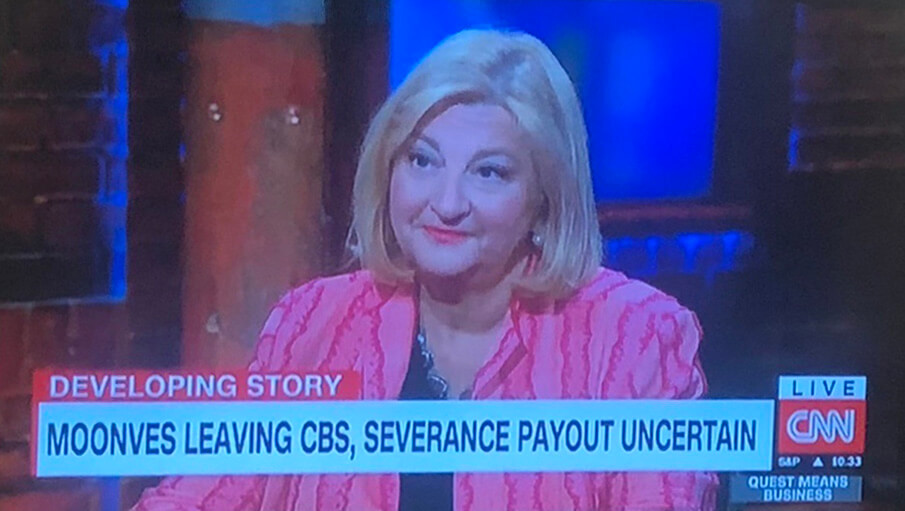
It’s a pivotal moment for the #MeToo Movement and for CBS. Their Chief Executive, Les Moonves, is leaving the company immediately, pushed out by fresh accusations of sexual assault. Moonves is the first Fortune 500 CEO to be ousted through the #MeToo era.
The controversy isn’t over because the details of Moonves’ payout is still to be decided. CBS shares have regained some of the early losses. They are still down for the day, that’s partly because with Moonves gone, the battle for control of CBS has come to an end.
Richard Quest talked to media reputation strategist, Davia Temin, about Moonves’ exit and potential payout, the #MeToo Movement, how a board should respond to years’ old allegations, and Serena Williams’ response to her fine at the U.S. Open. […read more]
Hawaii’s Investment Chief Got Fired. Then the Gossip Started.
Leanna Orr, Institutional Investor, April 23, 2018
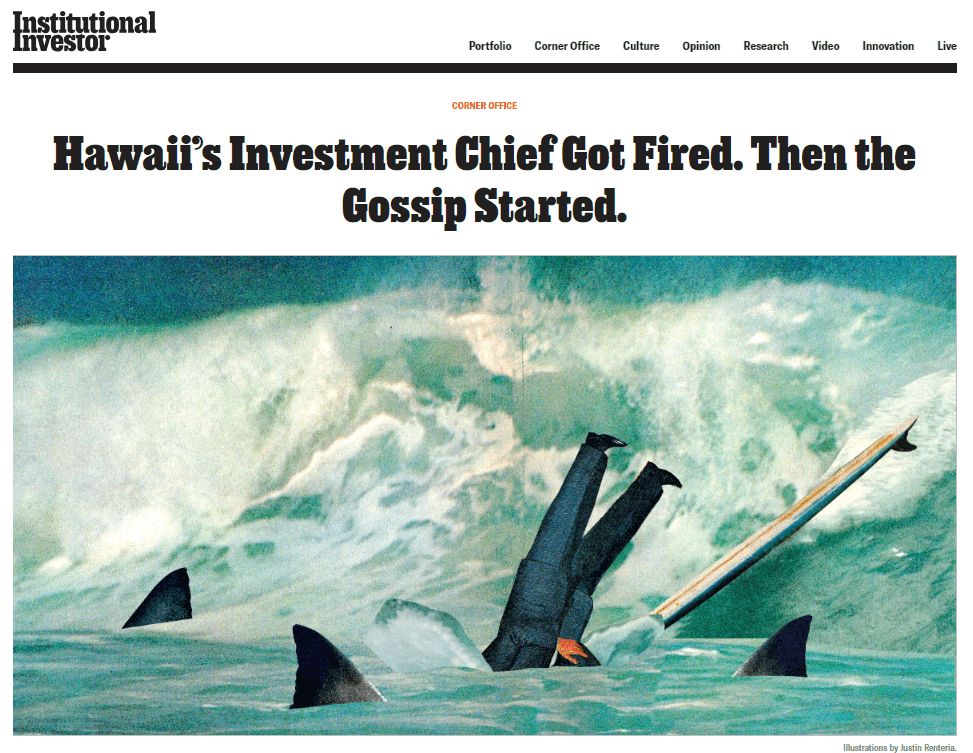
Firing the chief investment officer was the final order of business at the Hawaii pension board’s regular meeting on February 12. CIO Vijoy Chattergy was blindsided, insiders say. After seven years with the organization, Chattergy was told by his bosses that Monday that he was done, effective immediately.
When the news broke, people were just asking, ‘What happened? What did he do?'” By the time Chattergy’s ouster was hot industry gossip coast to coast — that is, within days — it was no longer a mystery. The narrative took hold that Chattergy had blown up Hawaii’s pension fund with a risky bet turned bad, then lost his job over it.
ERS executive director Thomas Williams initially refused to discuss the situation, though ultimately he notified the staff by email. Williams said what an organization’s leader should after executive upheaval, according to crisis PR consultant Davia Temin. He just did it a month too late.
“People are let go all the time,” says Temin, who reviewed the timeline and the documents associated with Chattergy’s ouster. “Whether the reasons are pretty benign or more egregious, the best practice is to act with the most elegance possible. And that means you allow someone their dignity as they leave,” she notes. “You don’t malign them or allow them to be maligned by doing and saying nothing, by keeping it a mystery. People will fill in that huge void with something far worse than reality — it’s human nature.” […read more]
Leadership at the Crossroads Part 3: Courage to Speak Boldly When it Counts.
Gloria Feldt, The Sum – The Meaning of This Week, April 2, 2018

This article’s author asks readers whether they plan to delete their Facebook accounts in the wake of the controversy that threatened to unseat the social media giant. She also looks to Davia Temin’s Forbes post about what Mark Zuckerberg should have done and said.
“Facebook has been larger than life in our worlds for over a decade,” said Davia Temin. “We have trusted it enough to bring it into our homes and bedrooms, our commutes and workplaces, our friendships and our families until it has almost reached ubiquity. So Facebook’s responses to such a larger-than-life issue as this — the possible dissolution of our sovereign decision-making process — must be bigger than life, too. And far, far better.” […read more]
Nike Scandal Threatens Its Image With Women at Tumultuous Time
Matthew Townsend, Bloomberg, March 22, 2018
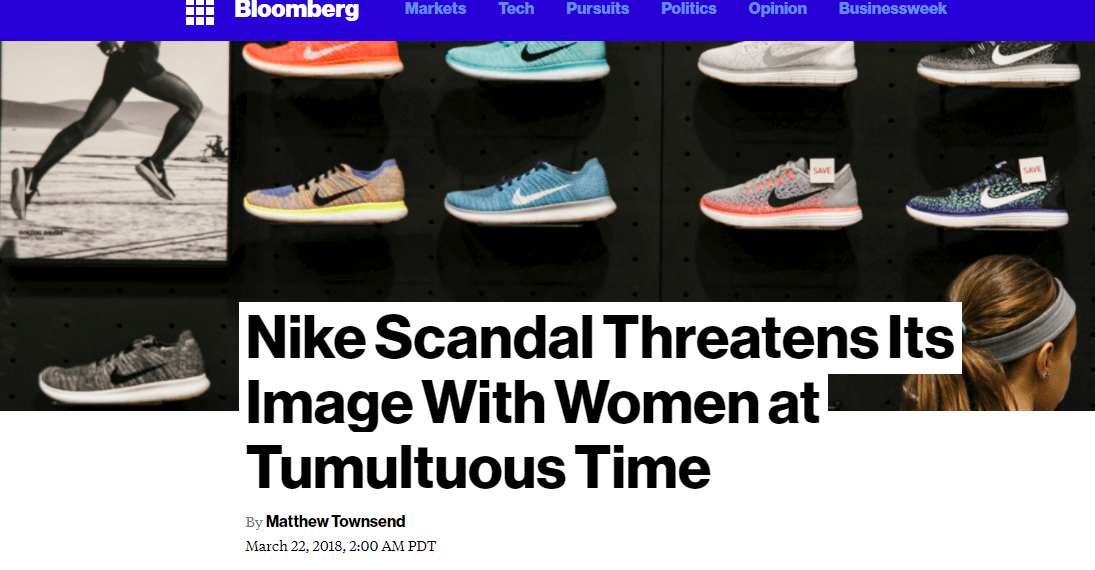
It’s never a good time for companies to grapple with a scandal over sexist behavior. At Nike Inc., it’s especially awkward given its ambition to target female shoppers.
The world’s largest sports brand expects much of its future growth to come from selling more sneakers and gear to young women. And fresh concerns about a locker-room mentality could hurt Nike’s reputation with a demographic group that it desperately needs. That risk looms over a company that saw two high-profile executives step down last week amid a broader review of misconduct.
“It’s an enormous reputational risk,” said Davia Temin. “We know millennials want to work for places that have a higher purpose. They are going to put their buying power in the same place.”
The company is especially ripe for being deemed phony and inauthentic, she said. Unlike some other businesses caught up in the #MeToo movement — a push to improve treatment of women, especially in the workplace — Nike has marketed itself as a champion of female empowerment, Temin said. Anything that undercuts that image could be a brand killer. […read more]
Opinion: Facebook’s Zuckerberg had 15 minutes to respond to privacy crisis — he took four days
Howard Gold, MarketWatch, March 22, 2018
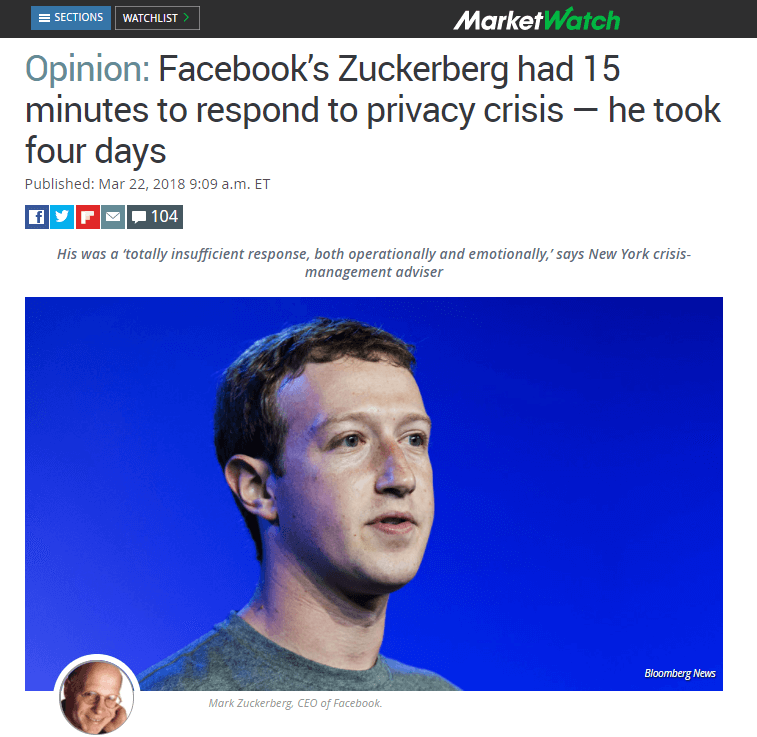
Facebook’s Mark Zuckerberg finally broke his silence late Wednesday afternoon.
In a long and technical statement posted on his Facebook page, the CEO addressed the massive misuse of personal information in which a researcher was able to release data on 50 million Facebook users without their consent to Cambridge Analytica, a firm that worked closely with the Trump campaign during the 2016 presidential election.
Davia Temin said Facebook missed its chance to shape the narrative in its favor, and Zuckerberg’s statement did nothing to change that. “This is a totally insufficient response, both operationally and emotionally,” she said. “Yes, it is prescriptive, yet strangely hollow, limited, unemotional, and lacking any form of apology.” She added that it made Facebook look like it was “fiddling while the world is burning.” […read more]
President Trump Cedes Moral Leadership To Big Business
Alexander C. Kaufman, The Huffington Post, August 19, 2017
A deadly attack by an avowed white supremacist shocked the nation. The president’s response came swiftly, and triggered raw emotion. Despite a sometimes strained relationship with the White House, corporate board rooms stayed silent, spared the need to weigh in.
That was 2015.
This week, chief executives at some of the country’s biggest companies tossed out usual protocols and disavowed the sitting commander-in-chief after President Donald Trump refused to single out the white supremacists and neo-Nazis who rallied in Charlottesville, Virginia, last weekend.
Of course, distance from the leader of the ruling political party won’t cost executives their jobs like it might lawmakers facing reelection in an era of hyper partisanship. At a particularly circus-like time in politics, this gives companies the ability to “become the adults in the room,” said Davia Temin, a management coach and reputation consultant who worked with some of the companies whose leaders resigned from Trump’s councils this week.
“Business has a planning and strategic horizon that is further out than four years or eight years or 12 years,” she told HuffPost. “They can actually have a counterpoint and be the counterbalance to the short governance by tweet.” […read more]
Trump CEO Brain Trust Huddles as Corporate America Splits
Justin Sink and Matt Townsend, Bloomberg | Quint, February 3, 2017
President Donald Trump has needled Mary Barra at General Motors Co. He’s troubled Doug McMillon at Wal-Mart Stores Inc. and gone after Boeing Co., once headed by Jim McNerney. Those business leaders, and about a dozen others, sat down on Friday with Trump to talk trade, regulation and more.
In his first two weeks as president, Trump has rewritten the Washington playbook for corporate America, as he has for U.S. allies. In the process, he has opened rifts between companies over how to approach matters ranging from taxes to immigration and revealed the first cracks in companies’ tentative embrace of him, drawing criticism from some of the chief executives who were in the room Friday morning.
The meeting is the latest in a series of White House events designed to allow Trump to solicit feedback from business leaders — and burnish his image as a can-do businessman ready to strike deals. The events usually start with pictures and video clips to feed the news cycle and then a closed meeting with the president and top aides.
After the photo ops is when it gets interesting, of course, and it could be up to Blackstone’s Schwarzman to keep things in order, said Davia Temin, founder of the crisis-management company Temin & Co. in New York. If he’s allowed to be in charge, he should run it like a board meeting, with vigorous but respectful debate.
“One model is a high degree of professionalism and politeness, even while being tough and entrenched in your questioning,” she said. But “some boards are different — some boards you have knock-down, drag-outs.” […read more]
More News Articles



